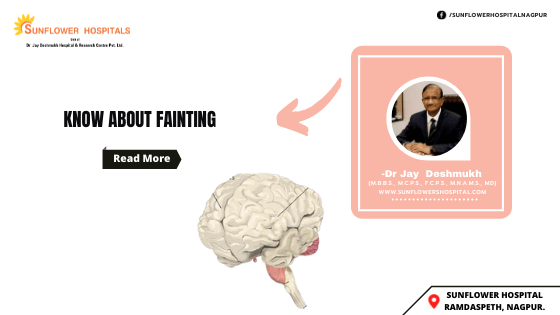A sudden drop In blood supply to the brain results in fainting. It usually lasts for a few seconds or minutes, then the person wakes up and becomes normal. The person loses consciousness for a short period of time.
Is fainting a matter of concern?
Generally, in most individuals, it is not a matter of concern. But if you often faint or have other symptoms, you should seek medical attention.
Are there any warning symptoms before you faint?
Many times one may feel cold and clammy, dizzy, light-headed. Sometimes you may feel hot and suddenly sweaty. Excess fatigue, nausea, and a feeling of being stressed out could be some symptoms prior to a fainting episode. In addition, a person may fall down, get headaches, have visual changes, have heart sounds in the ears, and may have a loss of control over muscles.
When should you worry about fainting?
Sometimes fainting can be a cause of serious underlying medical issues. You should see a Physician who would analyze and diagnose whether the fainting is worrisome or not.
What are the serious causes of fainting? Fainting usually occurs due to a temporary drop in blood pressure. The brain does not get the requisite blood supply, and you lose consciousness. One serious cause of fainting could be a sudden drop in blood pressure due to excessive bleeding. This can be in the stomach or intestines or from the largest blood vessel of the body, the aorta. There are many heart disorders that may cause fainting. This occurs more commonly in individuals above 60 years of age. These include various types of heart blocks, an irregular heart rhythm, very fast or very slow heart rate, and narrowing of the heart valve, particularly the aortic valve.
Can you die from fainting?
Of the greatest concern is fainting caused by episodes of a slow or fast heart rate. The most dangerous is a heart rhythm disturbance called ventricular tachycardia or ventricular fibrillation. In Ventricular Fibrillation, after 4 to 5 seconds you lose consciousness, stop breathing, and have no pulse. When this happens, it is called sudden cardiac arrest. Unless someone. Restores normal heart rhythm with an automated external defibrillator (AED), you will die in 10 minutes. Sudden cardiac arrest is fatal 95% of the time.
What are the predisposing causes for sudden cardiac arrest?
Scarring of the heart due to previous heart attack, poorly managed heart failure, a low ejection fraction, family history of unexplained death at a young age, and smoking. If you have any of these risk factors your doctor will test the electrical system of your heart by ECG record. If you are found to be at risk of Ventricular fibrillation or having a sudden cardiac arrest episode, an Implantable Cardioverter defibrillator (ICD) can save your life. Whenever an episode occurs, the 1CD will automatically restore normal sinus rhythm within seconds.
What is the commonest cause of fainting?
In about 1/3 of the population, vasovagal syncope occurs. It is by far the commonest cause of faint-ing. It is often triggered by a combination of dehydration and an upright posture. Not only that, but it can also have an emotional trigger, like after seeing blood. Getting an injection, having blood drawn for evaluation, standing up quickly, standing upright for a long time, sudden or unexpected trauma, stress, or pain, and blood donation. What about situational fai Sometimes bouts of coughing, sneezing laughing, pressure on the chest after exertion or exercise, defecating, urinating in a standing position in men, or lifting weights can trigger a fainting episode.
What to do if a person faints?
One should check the pulse rate, elevate the limbs, turn the person on one side and rush hint to the nearest hospital if the patient does not regain consciousness in a minute or two. The treatment may include catheter ablation of specific heart cells responsible for abnormal heart rhythm, pacemaker, ICDS, and of course avoiding known triggers.
What are tests done to diagnose a fainting episode?
Besides the common blood tests, ECG and Exercise stress tests, Echocardiogram, detailed Physical examination including checking blood pressure in standing and the Tilt Table Test that simulates prolonged standing. Bolter monitoring or an event monitor is also necessary. After examining the patient, the doctor decides which test and treatment are most suitable for the individual. Fortunately, the youngest populations may not have a serious cause for their fainting. Some individuals, particularly the elderly group may have a significant underlying cardiovascular illness that would require specific treatment.
Author: Dr Jay Deshmukh
Dr Jay Deshmukh is Chief Physician and Director, Sunflower Hospital, Nagpur Honorary Physician to Honorable Governor of Maharashtra and PondicherryCentral. Dr Jay Deshmukh is an M.B.B.S., M.C.P.S., F.C.P.S., M.N.A.M.S., MD From Internal Medicine – Bombay and New Delhi.


